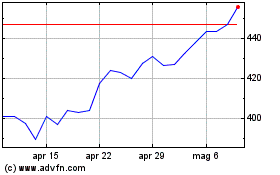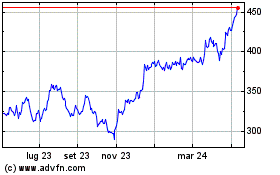Private Trades in Spotify Shares to Play Key Role in Upcoming Debut
19 Febbraio 2018 - 1:29PM
Dow Jones News
By Maureen Farrell
Spotify AB is counting on its surging private-market value to
bolster the music-streaming service's appeal to investors in an
unorthodox public debut that could be the biggest since Snap Inc.'s
$20 billion IPO last year.
The listing, expected as soon as the end of March, isn't an
initial public offering, in which underwriters set a price and
place shares with chosen investors before trading. Instead, the
Swedish company will simply float the shares on the New York Stock
Exchange and let the market find a price, in what is known as a
direct listing.
The unusual approach means Spotify must find novel ways to guide
the market to a price, and private trading is expected to be a key
part of that effort, people familiar with the matter said.
The so-called secondary markets in private technology stocks are
typically an afterthought in an IPO, in part because trading tends
to be thin and not always a reliable indicator of value. But
Spotify and its advisers at Goldman Sachs Group Inc., Morgan
Stanley and Allen & Co. are closely watching trades among
private investors and have taken steps to spur volume, the people
said. The company recently informed existing investors that it
waived its right to buy shares before they are offered to
others.
In recent months, Spotify's shares have traded at valuations
between $17 billion and $18 billion, according to people familiar
with the transactions. At those levels, Spotify's debut would be
the largest for a tech company since Snap went public.
There is another signpost for Spotify's value: Late last year
the company swapped stakes with Chinese internet giant Tencent
Holdings at a valuation of nearly $20 billion.
And one investment bank that is representing a potential new
investor recently approached some current shareholders and tested
their appetite for selling stock at a $20 billion valuation but
found no takers, a person familiar with the communications
said.
But there is little precedent for the kind of direct listing
Spotify is attempting and it is anyone's guess how the shares will
trade.
There is no formal system for trading Spotify shares and
transactions are facilitated on a case-by-case basis by a network
of investment banks, fund managers and others.
Trading in Spotify shares has been relatively robust, however.
The company puts fewer restrictions on stock sales by employees or
early investors than many other private tech startups, some of whom
heavily restrict trading. While Spotify previously had the right of
first refusal on shares for sale, people familiar with the matter
say the company rarely exercised it and typically let sellers
process transactions quickly -- in contrast to some private
companies notorious for taking days or months to approve or deny
trades.
Spotify's shares have been trending higher since late 2016,
according to people familiar with the private transactions. At that
time, the shares traded at levels valuing the company at $6 billion
to $7 billion, or about $1,670 apiece. That is below the $8.5
billion valuation the company received when it raised new money in
2015.
But by early 2017, the valuation had jumped to roughly $12
billion, these people said; by the second half of 2017, it was up
to $15 billion.
Two of the largest buyers of Spotify's shares in the private
markets in the past several years were Tiger Global Management LLC,
which has invested about $700 million since 2015, and DIG
Investment, a firm that invests on behalf of U.S. and Swedish
family offices.
Founders Fund, the venture-capital firm co-founded by PayPal
Holdings Inc. co-founder Peter Thiel, and DST Global, run by
Russian billionaire Yuri Milner, were also big investors. They
exited part or all of their stakes in 2016 when the valuation was
$6 billion to $7 billion, people familiar with the trades said. Mr.
Milner's firm first invested in Spotify in 2011 when it was valued
at $1 billion. It isn't clear at what price Mr. Thiel's firm
invested.
Meanwhile, a consortium including private-equity firm TPG, hedge
fund Dragoneer Investment Group and clients of Goldman, which lent
Spotify $1 billion, converted their debt to shares at a price that
valued the company at as much as $13 billion, people familiar with
the deal said.
That debt had been designed to convert into stock when the
company went public through a traditional IPO. Since Spotify
decided to list its shares directly, the debt wouldn't have
automatically converted, but Spotify let them do so at the highest
possible price, the people said.
Many of the investors in the consortium, including TPG and
Dragoneer, are expected to be buyers once Spotify is public, people
familiar with the matter said.
Write to Maureen Farrell at maureen.farrell@wsj.com
(END) Dow Jones Newswires
February 19, 2018 07:14 ET (12:14 GMT)
Copyright (c) 2018 Dow Jones & Company, Inc.
Grafico Azioni Goldman Sachs (NYSE:GS)
Storico
Da Mar 2024 a Apr 2024

Grafico Azioni Goldman Sachs (NYSE:GS)
Storico
Da Apr 2023 a Apr 2024
